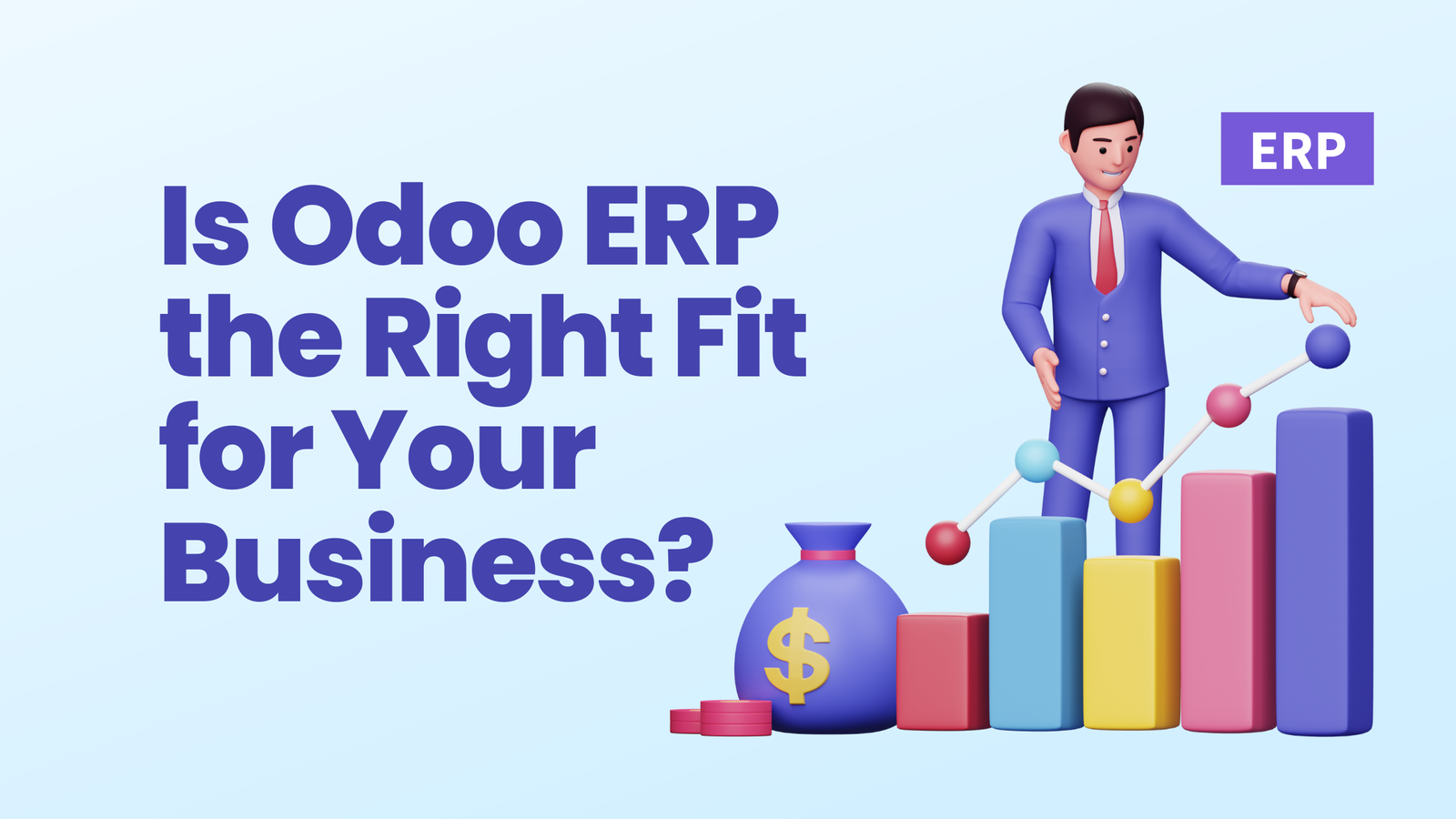If you’re considering an ERP system to streamline your business operations, you’ve probably encountered Odoo — one of the most popular and flexible enterprise resource planning solutions out there. But how do you know if it’s the right fit for your business?
In this guide, we’ll explore Odoo ERP’s features, benefits, challenges, and whether it’s the right solution for your business needs. Whether you’re a small startup or a large enterprise, understanding how Odoo can transform your processes is key to making an informed decision.
What is Odoo ERP?
Definition and Key Features
Odoo is an open-source ERP system that integrates business processes like sales, inventory, accounting, manufacturing, and human resources into one unified platform. With over 30 modules, Odoo allows businesses to manage their entire operations from a single interface. Whether you’re managing finances, customer relationships, or inventory, Odoo provides the tools to automate and streamline those processes.
Key Features:
- Accounting & Finance: Manage financial data, create invoices, track payments, and generate reports.
- Sales & CRM: Streamline your sales cycle and improve customer relationships with automated workflows.
- Inventory & Manufacturing: Control stock levels, track orders, and optimize production schedules.
- Project Management & HR: Monitor projects, track time, manage employees, and maintain payroll.
Benefits of Using Odoo ERP
1. Cost-Effectiveness
One of the primary reasons businesses choose Odoo is its affordability. Unlike other ERP systems like SAP or Oracle, Odoo offers a highly competitive pricing model. As an open-source platform, the base version of Odoo is free, and businesses only pay for additional modules and services they need. This makes it accessible to both small businesses and large enterprises.
When compared to traditional ERP systems, Odoo’s pricing structure allows businesses to scale without worrying about escalating costs.
2. Scalability
Whether you’re a startup or a global enterprise, Odoo can grow with your business. Its modular structure allows you to start small and add more features as your business needs evolve. As you expand, Odoo ERP ensures that your business processes remain seamless and interconnected across multiple departments.
3. Customization and Flexibility
Another significant benefit of Odoo is its customization potential. If you need a specific feature or functionality, Odoo allows you to modify or create custom modules to suit your business requirements. From custom reports to specialized workflows, Odoo offers an unmatched level of flexibility.
You can also enhance your Odoo ERP experience by tapping into a wide range of third-party apps available on the Odoo App Store.
4. User-Friendly Interface
Odoo is known for its intuitive design, making it easy for both technical and non-technical users to navigate. The user-friendly interface means your employees won’t need extensive training to start using the system effectively. This ease of use also reduces the learning curve associated with ERP systems.
5. Seamless Integration
Odoo integrates seamlessly with other platforms, allowing you to connect your ERP system with existing tools like e-commerce platforms, payment gateways, and CRM systems. This means you can keep using your favorite tools while benefiting from the centralized control of Odoo’s ERP system.
Is Odoo ERP Right for Your Business?
1. Business Size and Complexity
Odoo is versatile enough for both small businesses and large enterprises. For small and medium-sized businesses (SMBs), Odoo offers an affordable and scalable solution that simplifies operations and improves efficiency. However, larger businesses with complex processes and multiple locations may find Odoo’s flexibility a perfect fit, as it can be customized to handle sophisticated needs.
In fact, Odoo’s modular structure makes it suitable for businesses in a wide range of industries, including retail, manufacturing, healthcare, and education.
2. Customization Needs
If your business has specific requirements, such as niche industry features or a unique business model, Odoo’s customization options make it an ideal choice. You can either modify the existing modules or create entirely new ones to cater to your needs.
For example, if you’re in the retail industry and need advanced inventory tracking, you can tailor Odoo’s inventory management module to fit your specific needs.
3. Budget Considerations
While Odoo is one of the most affordable ERP solutions, you must carefully evaluate your budget before diving in. If you’re a small business with limited resources, you may want to start with the basic version and then scale as your business grows. Larger businesses or those requiring more advanced functionality may need to budget for additional modules and Odoo ERP Implementation services.
4. Ease of Implementation
Odoo’s implementation process is relatively straightforward compared to traditional ERP systems. However, it’s important to have a clear plan and timeline for implementation. For businesses with in-house IT teams, implementation may be simpler, but many businesses opt to work with experienced consultants to streamline the process.
5. Long-Term Viability
When selecting an ERP system, it’s important to consider whether it will meet your business’s long-term needs. Odoo’s open-source nature, constant updates, and vast ecosystem of apps and services make it a highly future-proof choice for growing businesses. You’ll always have the flexibility to add new features or upgrade the system as your business evolves.
Challenges of Using Odoo ERP
1. Learning Curve
While Odoo is generally user-friendly, there is still a learning curve for new users, especially for those unfamiliar with ERP systems. Employees may require training to use certain features effectively. The complexity of customizing the system also adds a learning component for your IT team or Odoo consultants.
2. Integration Issues
Although Odoo integrates well with many platforms, integration with legacy systems can be challenging. Businesses with older or highly specialized software may face difficulties when trying to integrate with Odoo.
3. Support and Community
While Odoo has a vibrant community, finding high-quality support may sometimes require additional effort. Some users report that Odoo’s community forums, while helpful, may not always provide the level of support needed. Businesses seeking personalized support often turn to certified Odoo consultants.
Comparing Odoo ERP with Other ERP Systems
Odoo vs. SAP
When comparing Odoo and SAP, Odoo stands out as a more affordable and flexible option, especially for small to medium-sized businesses. While SAP is renowned for its robust features, it often comes with a high price tag and is better suited for large enterprises with highly specific needs. In contrast, Odoo excels in offering customization and ease of use, making it an excellent choice for businesses looking for a tailored solution without the complex and expensive setup that SAP typically requires.
Odoo vs. Microsoft Dynamics
Odoo vs. Microsoft Dynamics presents a clear contrast in terms of complexity and flexibility. While Microsoft Dynamics is a powerful ERP tool, its implementation can be more complicated and costly. On the other hand, Odoo’s modular structure and cost-effectiveness offer businesses a more flexible and streamlined ERP solution. Odoo provides the same robust features while being simpler to implement, making it an ideal choice for companies looking for an efficient system without the complexity of Microsoft Dynamics.
Odoo vs. Oracle NetSuite
When comparing Odoo vs. Oracle NetSuite, Odoo emerges as a cost-effective alternative. While Oracle NetSuite is an enterprise-level ERP system with advanced features, it often comes with a significantly higher price tag. Odoo offers a robust ERP solution that provides many of the same capabilities but at a much more affordable cost, making it an excellent choice for businesses that need a powerful system without the financial strain associated with Oracle NetSuite.
Case Studies: Success Stories Using Odoo ERP
Small Business Example: A Retailer’s Success
A small retailer implemented Odoo to streamline their inventory management, sales, and accounting functions. After customizing the system to track their stock more efficiently, they saw a 20% increase in sales and a 15% reduction in operational costs within the first year of implementation.
Enterprise Example: A Global Manufacturer
A large manufacturing company with locations across several countries implemented Odoo ERP to handle everything from HR to inventory. Odoo’s scalability allowed them to unify their operations and reduce costs by automating routine tasks.
Conclusion: Is Odoo ERP Right for You?
After evaluating Odoo ERP’s features, benefits, challenges, and costs, it’s clear that Odoo is a powerful and flexible solution that can benefit businesses of all sizes. Its affordability, scalability, and customization options make it a great fit for small businesses and large enterprises alike. If your business requires an easy-to-use ERP system that can grow with you, Odoo could be the perfect solution.
For businesses in India, partnering with an experienced consultant can help you unlock the full potential of Odoo. Odoo ERP Implementation services in India can guide you through the process, ensuring a smooth setup, customization, and long-term success.





